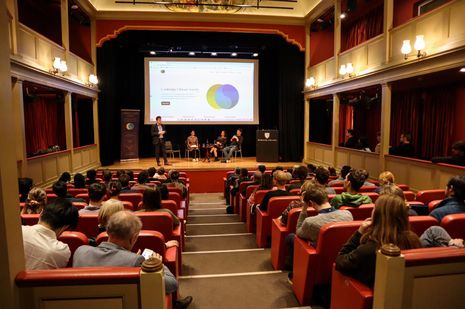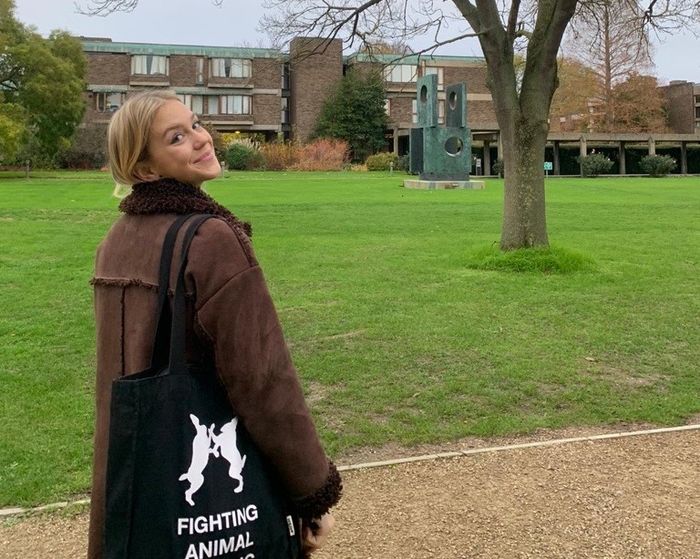‘The most important issue of our time’: an interview with Cambridge’s Climate Society
Millie May, Education Lead for Cambridge Climate Society, speaks to Riannon Chaplin about activism, inequality and their new open letter

The Climate Clock stares down at New York’s Union Square from four storeys above. The seconds tick by quietly as the people below rush to and from work, school, or to see their friends. But the clock’s message is stark: there are six years and 119 days remaining until we’re out of time to save the planet from the effects of man-made climate change. And that number is always falling.
This is why Cambridge Climate Society, and especially their Educational Lead, Millie May, are “dedicated to connecting, educating and empowering people on the most important issue of our time.” In Millie’s experience, students at Cambridge are “really engaged” with climate issues, and interest in CCS’ events shows this. Events range from a Climate Justice Workshop and career mentoring to a regular book club and a vegan cookery evening, all free of charge and open to everybody.
CCS’ Advisory Board boasts such names as Sir David King, the former Cambridge professor and Chief Scientific Advisor, and Professor Emily Shuckburgh, director of climate change initiative Cambridge Zero. It’s a very different kind of activism to what Cambridge has seen from groups like Extinction Rebellion and This Is Not A Drill. Infamously, the latter broke windows at the Department of Chemical Engineering and Biotechnology last month, protesting the department’s links to fossil fuel companies.
“There’s no one silver bullet to solve climate change”
“I don’t think there’s a right or wrong way to do [climate activism],” Millie continues. “There’s no one silver bullet to solve climate change [...] There’s important work that every single different approach provides.” This unity is at the heart of CCS’s activities and their new Education Campaign. Their open letter, which calls on the Vice-Chancellor to improve climate education across subjects and levels of study at Cambridge, demands an approach to integrate “subject-specific climate change modules” into all degrees, introduce free, stand-alone courses through a Climate Education Centre, and create a ‘Climate Change Science and Policy’ undergraduate degree.
“It’s really important that students’ voices are plugged in at every level,” Millie explains. The letter calls for a Youth Advisory Board to be established, composed of student representatives from all subjects.
This conversation is already happening at CCS events. Their Coffee Club pairs members up via email and encourages them to meet up to discuss climate issues. Some events are about discussion, but some are about action: the society’s recent Hackathon on 11th March saw teams of students compete to write proposals and give presentations to a panel of judges.
The programme set out in the open letter is certainly an ambitious one, with an emphasis on building capacity among teaching staff to integrate subject-relevant climate content into lectures, reading lists, seminars and extracurricular activities. I raise the issue that these demands could simply put more pressure on academics who are already overburdened. “I think if that process is in place to identify certain concerns staff may have,” Millie responds, citing a proposed Citizens’ Assembly which would represent the concerns of students, staff and departments, “then the worries of lecturers will be solved, in that sense.”
Millie appears unfazed when I query how these demands would be funded. “We know the University has a lot of money, and it’s been investing in so many different projects.” She points to the fact that structures for student and staff representation already exist. “I don’t think the budget for this money is the issue at all.”
For CCS, the way in which the education is delivered is as important as the education itself. The open letter calls for the new courses to “highlight climate justice as decolonised”. Millie explains that decolonisation “is at the core of climate change in terms of, for example, the inequalities that exist between the Global North and the Global South, and making sure that all voices are highlighted.”
Last summer, severe flooding in Pakistan highlighted that richer countries cause the majority of CO₂ emissions while developed countries face the most severe climate-related natural disasters. At the COP27 conference in Egypt, held last November, delegates reached a ‘historic’ deal to set up a global ‘loss and damages’ fund to provide assistance to nations facing climate disasters. To Millie, this is a victory: “you can’t really solve climate change without highlighting the issues and implications of climate justice.”
At the time of writing, the open letter has over 300 signatures. If implemented, the proposed changes would offer every Cambridge student the opportunity to access free climate education and develop the skills to implement solutions in the future. As we end our call, I can tell that Millie is optimistic about the campaign’s success. “I think this petition is, in a way, a solution and a stepping stone for individuals to fully understand the place they have in solving climate change, in the future and currently.”
 News / Eight Cambridge researchers awarded €17m in ERC research grants27 December 2025
News / Eight Cambridge researchers awarded €17m in ERC research grants27 December 2025 News / Clare Hall spent over £500k opposing busway 24 December 2025
News / Clare Hall spent over £500k opposing busway 24 December 2025 Comment / League tables do more harm than good26 December 2025
Comment / League tables do more harm than good26 December 2025 Comment / The ‘class’ of Cambridge24 December 2025
Comment / The ‘class’ of Cambridge24 December 2025 News / Caius mourns its tree-mendous loss23 December 2025
News / Caius mourns its tree-mendous loss23 December 2025









